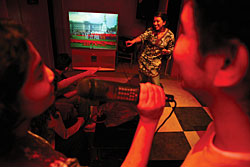 |
If you're such a bad singer that you croak like a toad, don't worry. You're more than welcome at any of the new karaoke bars in Kathmandu, where after a few drinks you will have the distinct impression you can sing like Frank Sinatra.
Karaoke is a new fixture in the Valley's popular culture, and karaoke bars have caught on as a favoured hangout for people weary after slogging all day at work.
We've taken a cue from the Philippines, where half the population has a karaoke box at home. Filipinos even host their own singing and dancing competitions! Karaoke is a form of daily recreation and an absolute must at all get-togethers and festivals in the Philippines.
Little wonder then that it was Roselle Prisno from the Philippines who set up Kathmandu's first karaoke bar in her restaurant Baryo Fiesta in Naxal. It was an instant hit. Nepalis showed up from day one howling like wounded dogs into the microphone.
"People come here and have the most enjoyable time and it's nice for us to be sharing this love for singing with Nepalis," Prisno says.
Thirty-year-old Shweta Pradhan visits Baryo Fiesta regularly to unwind after work. "It's the most effective stress buster for me. When I sing everything that's bothering me comes out, and though it's late when I get home I end up feeling really refreshed after an evening of karaoke," she says.
Karaoke is apparently also a great way to work out since it increases oxygen levels in the blood without leaving you hot and sweaty. It also produces 'feel-good' endorphins (eating chocolate does too, but singing is less fattening). Doctors in Japan and Taiwan are now prescribing karaoke instead of Prozac to cure stress.
If you don't like going out but are eager to try karaoke, you can do so from your couch at home. All you need is a computer microphone and software that's available online. Croon to the moon!
Top Ten Karaoke Hits
My heart will go on - Celine Dion
Everything I do - Bryan Adams
Always - Bon Jovi
Every breath you take - The Police
Summer of '69 - Bryan Adams
All summer long - Kid Rock
Born to be wild - Steppenwolf
Hotel California - The Eagles
I love rock n' roll - Joan Jett and the Blackhearts
I will survive - Gloria Gaynor
Karaoke Bars in Kathmandu
Baryo Fiesta, Naxal
Everest Korean Restaurant, Sorakhutte
Station, Lazimpat
Cafe de Patan, Patan Darbar Square
Korea-Pyongyang Okryu-Gwan Restaurant, Darbar Marg
Korea-ke bar
 MIN RATNA BAJRACHARYA |
The restaurant near Yak and Yeti in Darbar Marg is a modern looking affair with bright neon tube lights. It's hosted by smiling Korean girls in baby pink and blue suits who look like stewardesses with Air Koryo, the hermit kingdom's flag carrier. We were escorted into one of seven cosy private karaoke rooms, where we found an impressive list of songs in English, Korean, Hindi and Nepali. We jumped right in and a raucous evening of off-key screeching followed.
A couple of hours later the bill put paid to our mood. A thousand rupees just for the room, in addition to exorbitant prices for everything from water to ice cream.
I returned a few days later, still miffed, but determined to investigate the bar's Pyongyang connections. The management was tight-lipped, never mind that its business is to get people to open up. A dour looking lady behind the counter was clearly in charge but she totally ignored me. Instead, one of the attendants came over and handed me a brochure that purportedly contained all the information I needed. I tried to extract more 'information' out of her, but it seemed she spoke neither Nepali nor English. Perhaps she had been warned not to divulge any more than was absolutely necessary?
But I did pick up some snippets. The restaurant has been around for two years and is attended to by 11 waitresses, all unmarried, who sing and dance at specific times listed in the brochure. All the other branches of the restaurant are in China. The restaurant is frequented by our own comrades when they have to meet their diplomatic connections. They seem to find the privacy they want in the cubicles, but I doubt they ever turn on the karaoke machine for a session of Sino-Nepali duets.
Finally, I broached the big question. "Who owns the restaurant?" The waitress pointed to the lady behind the desk. "Can I get her name?" The answer was an unsurprising "no". North and South Korea are different, she seemed to imply, and, unlike the former, the latter do not like to feature in bar reviews.
Surabhi Pudasaini
'This one goes out...'
Tonight, in karaoke bars around the world, something more profound than you might realise will be happening
About the karaoke machine, that most prophetic of postmodern leisure devices, almost any number of intelligent-sounding things can be said: like the cellphone and the iPod, it seems to have invented us more than we invented it.
You can say, for example, that ours is a Karaoke Age, in which the arts of mimicry and simulation are more esteemed than originality or sincerity. You can say that in the trash democracy of global pop culture, where the anonymous soul has been replaced by the undiscovered star and the celebrity-in-waiting, it is karaoke that has ritualised the emergence of this inner performer.
None of this, however, will get you near the true nature of karaoke. Deeply awful at times, even sordid, it is never less than interesting ? and it can be revelatory. I once saw a friend of mine do Thin Lizzy's 'Jailbreak', and I've never been able to look at him the same way again. At the instant he sang "See the boys and me mean business?", he became legendary to me.
Karaoke, a book by Zhou Xun and Francesca Tarocco, tracks the westward spread of the phenomenon, from its birth in Japan in 1971 with the low-rent keyboardist and vibraphone player Daisuke Inoue to the installation of a karaoke machine in an English church, 30 years later. ("I'm afraid singing unaccompanied just wasn't the same," explained the vicar.)
Something of the mystery of karaoke is contained in its etymology. The word is a compound abbreviation of two Japanese words meaning 'empty' and 'orchestra'. Karaoke is above all a space, an absence haunted by the missing vocal line. The instrumental accompaniment is ghost-music, tinkling with its own deadness, and that unsung melody is spectrally beckoning, beckoning. The heart of the karaoke performer swells: into this vacancy he must project his beautiful essence, his soul. He or she may be emboldened or confused by alcohol, wild with a private grief, or, worst of all, suffering from a genuine desire to excel before his peers. Regardless, in the performance that ensues, something will be brought to light.
Tonight the bars will fill and the microphones will be gripped. So I dedicate this column to the karaoke-lovers, who will make tonight their own.
James Parker
The Boston Globe


